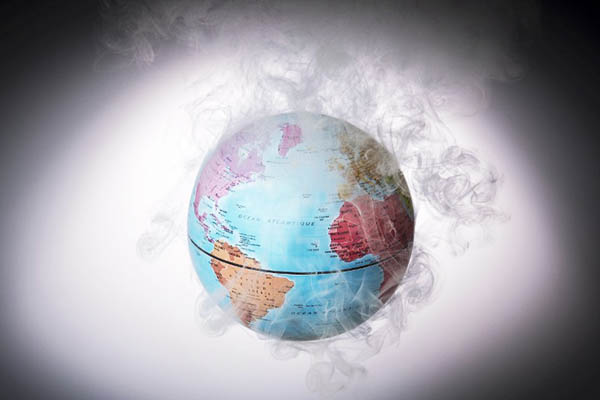
File photo. Lionel Bonaventure—AFP
Latest Intergovernmental Panel on Climate Change report warns that heat-related events in South Asia will grow in intensity and frequency
The United Nation’s Intergovernmental Panel on Climate Change on Monday released its latest report—the sixth since its founding in 1988—warning that some climate changes are now “irreversible,” emphasizing that human activity was to blame for the climate crisis.
Terming the report, which comes ahead of a November meeting of global representatives on climate, “code red for humanity,” U.N. Secretary General Antonio Guterres stressed that greenhouse gas emissions from fossil fuel burning, coal plants and deforestation were “choking” the planet. Joeri Rogelj, one of the authors of the report, told Britain’s The Guardian that this would likely be the last IPCC report before humanity ran out of time to maintain global warming levels under 1.5C of pre-industrial levels. He said that if emissions aren’t reduced before the next report is due, humanity would have to be prepared to deal with 2C or more warming and resultant devastating climate changes.
The report, which has been under development for 8 years, comprises the research of hundreds of experts and peer-review studies. It makes it clear that human activity is “unequivocally” responsible for a rise in sea levels, melting polar ice and glaciers, heatwaves, floods and droughts. It advises all nations that are set to attend the November COP26 meeting to come prepared with fresh plans to reduce greenhouse gas emissions, noting that this goal is still achievable—but only just.
Even if the world manages to limit warming to 1.5C, it warns, some changes such as sea level rises and Arctic ice melting would likely be “irreversible.” The report also notes that the best humanity could hope for is preventing worse climate change, adding that a return to the moderate weather patterns of the past was likely impossible.
John Kerry, special envoy to U.S. President Joe Biden, said: “The IPCC report underscores the overwhelming urgency of this moment. The world must come together before the ability to limit global warming to 1.5C is out of reach … Glasgow must be a turning point in this crisis.” Prime Minister Imran Khan, meanwhile, visited the site of the world’s “largest” urban forest in Lahore, noting that the recently released report validated his concerns about the environment.
“Pakistan has undertaken corrective measures beyond its capacity,” he said, claiming that tree plantation under his flagship Billion Tree Tsunami project would help the country overcome the worst effects of climate change. On South Asia, the IPCC report says that “both annual and summer monsoon precipitation will increase during the 21st century,” potentially boosting flooding and exacerbating devastating droughts during dry seasons.
Civil society groups have urged governments to act without delay on the report’s suggestions. Doug Parr, chief scientist at Greenpeace UK, told The Guardian: “This is not the first generation of world leaders to be warned by scientists about the gravity of the climate crisis, but they’re the last that can afford to ignore them. The increasing frequency, scale and intensity of climate disasters that have scorched and flooded many parts of the world in recent months is the result of past inaction. Unless world leaders finally start to act on these warnings, things will get much, much worse.”
Similarly, Stephen Cornelius, chief adviser on climate change at WWF, said: “This is a stark assessment of the frightening future that awaits us if we fail to act. With the world on the brink of irreversible harm, every fraction of a degree of warming matters to limit the dangers.”
